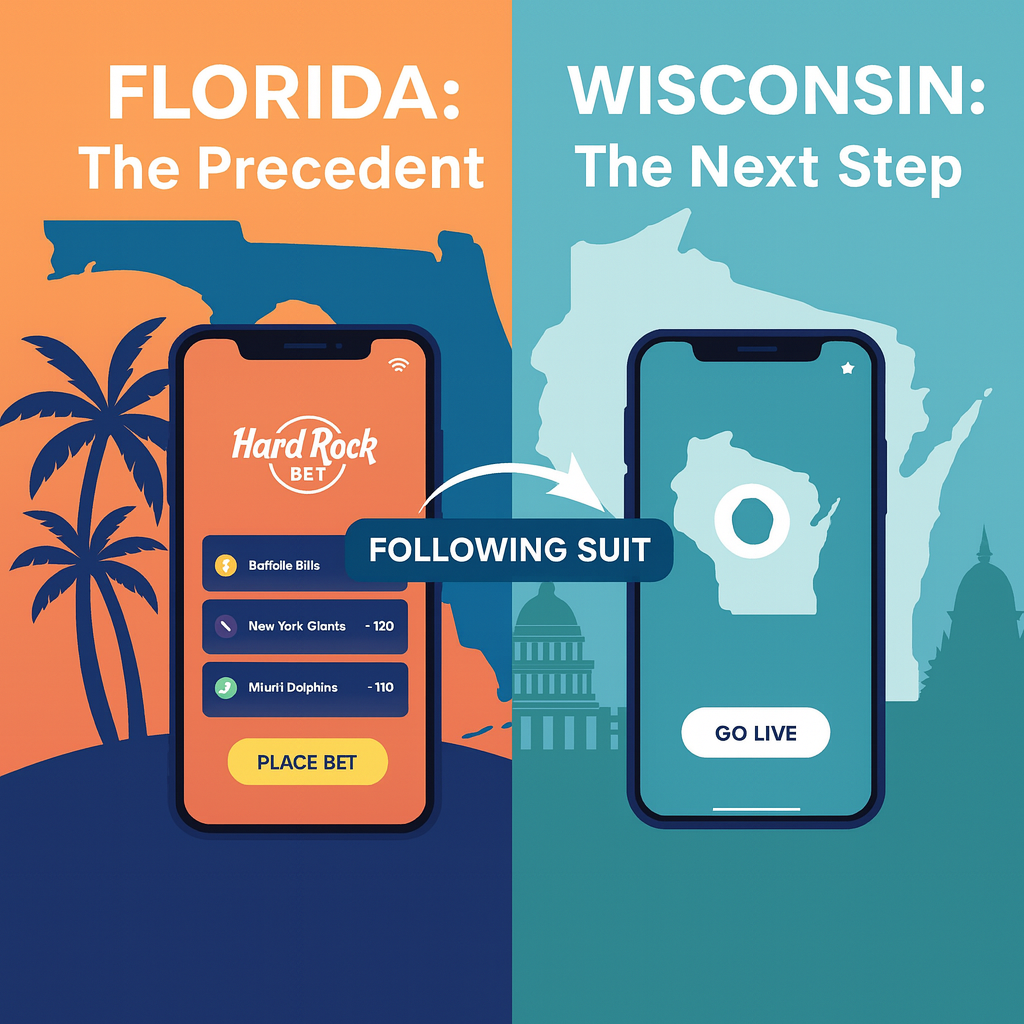Insights < BACK TO ALL INSIGHTS
Following in Florida’s Footsteps: Hub-and-Spoke Sports Betting Could Be Coming to Wisconsin.
Following in Florida’s Footsteps: Hub-and-Spoke Sports Betting Could Be Coming to Wisconsin.
By: John Mikuta
Statewide online sports betting may soon be coming to Wisconsin. Last week, a bipartisan group of Wisconsin legislators introduced a bill, LRB-4723/1, which would legalize online sports betting in the state.[1] If the bill is enacted into law, Wisconsin would become the 32nd state to allow online sports betting statewide.
Wisconsin has not yet enacted any statewide sports betting legislation. In fact, Wisconsin’s Constitution generally prohibits the legislature from authorizing “gambling in any form.”[2] Wisconsin law also provides that anyone who “[m]akes a bet” is guilty of a Class B misdemeanor.[3] The proposed bill gets over these hurdles by excluding from the definition of “bet” any online event or sports wager made by a person physically in Wisconsin, so long as the server processing the wager is physically located on the land of a federally recognized American Indian tribe.
Currently, in Wisconsin, sports betting is permitted only in on‑site sportsbooks located at casinos on tribal land. The Oneida Nation offers sports betting at its main casino near Green Bay,[4] the Potawatomi Casino in Milwaukee (an Ifrah Law client) opened an on‑site sports betting venue in May 2024, and the Ho‑Chunk Nation is planning to open sportsbooks at its various casinos around the state.[5]
If LRB‑4723/1 is enacted into law, the Governor of Wisconsin could negotiate compacts with any of these tribes and allow them to operate sportsbook servers that receive and process wagers from bettors located throughout the state. At this time, it is unclear how many of Wisconsin’s 11 federally recognized tribes will be permitted to operate a statewide online sportsbook. But given the various tribes’ strong interest in sports betting, the process of negotiating a compact with the state will likely be competitive.
The bipartisan bill proposes to implement a so‑called “hub and spoke” sports betting model, in which the sportsbook servers (hub) are located on tribal land, and the bettors with online devices (spokes) are located throughout the state.[6] Florida became the first state to employ this model in 2021. Florida’s model did not come about through legislation—instead, Governor Ron DeSantis directly negotiated a 30‑year compact with the Seminole Tribe giving the Tribe the exclusive authority to offer sports betting throughout the state. Importantly, the compact deemed all online betting to occur where the servers processing the bets are located. In 2023, the U.S. Court of Appeals for the District of Columbia Circuit upheld the legality of the compact, explaining that since the servers processing the bets are located on the Seminole Tribe’s land, the compact did not impermissibly authorize sports betting outside of tribal land.[7] The U.S. Supreme Court declined to take the case, allowing the D.C. Circuit’s decision to take effect.[8]
Subsequently, the Seminole Tribe launched Hard Rock Bet as Florida’s exclusive online sportsbook. Bettors can place wagers with Hard Rock from anywhere within the state of Florida. In 2024, Hard Rock Bet’s first full year of operation, the sportsbook brought in over $12 billion in handle and over $1.1 billion in gross revenue.[9]
Kansas amended its compacts with two tribes in 2023 and 2024, allowing the tribes to offer hub‑and‑spoke sports betting throughout the state.[10] The Kansas legislature approved both amendments and allowed them to go into effect. Other states, including California[11] and Minnesota[12] could negotiate similar compacts with their American Indian tribes to enable online sports betting in their states.
Any compact implementing a hub-and-spoke model for sports betting between the State of Wisconsin and one of its tribes would have to be approved by the U.S. Department of the Interior. The current Secretary of the Interior, Doug Burgum, rejected a proposal for a hub‑and‑spoke sports betting model in 2022, during his tenure as Governor of North Dakota. The North Dakota legislature did not approve the proposal, leading Burgum to state that “a clear legal path does not exist for the governor to grant such a broad expansion of gaming.”[13]
Of course, Burgum made that statement before the D.C. Circuit upheld Florida’s compact with the Seminole Tribe and greenlit the hub‑and‑spoke model. Furthermore, if LRB-4723/1 passes both houses of the Wisconsin legislature and is signed into law by Governor Tony Evers, Burgum will not be able to withhold approval on the basis of legislative opposition.
Although statewide online sports betting is currently not permitted in Wisconsin, prediction market operators such as Kalshi, Robinhood, and Polymarket offer sports event contracts in Wisconsin and throughout the U.S.[14] These contracts allow users to predict the outcome of sporting events. The Ho-Chunk Nation recently filed a lawsuit against Kalshi and Robinhood in a Wisconsin federal court, alleging that their prediction markets constitute unregulated sports betting.[15] The tribes’ strong opposition to prediction markets may make the hub‑and‑spoke sports betting system more attractive to legislators seeking to protect and grow the revenue stream generated by sports betting.
Allowing legal online sports betting in the state would bring to Wisconsin millions of dollars of tax revenue and economic impact from the multi‑billion-dollar sports betting industry. It would also protect Wisconsin bettors by ensuring that they can safely and transparently place wagers with sportsbooks that are strictly regulated by a gaming commission.
[1] LRB-4723/1, 2025–26 Leg. (Wis. 2025).
[2] See Wis. Const. art. IV, § 24.
[3] Wis. Stat. 945.02(1).
[4] Frank Vasvilas, Oneida Casino Readying New Betting Lounge for Super Bowl as Tribe Looks to Build on Early Sports Wagering Success, Milwaukee Journal Sentinel (Feb. 11, 2022), https://www.jsonline.com/story/news/native-american-issues/2022/02/11/super-bowl-approaches-oneida-casino-looking-build-early-sports-betting-success-in-wisconsin/6736970001/ (last accessed Oct. 23, 2025).
[5] Frank Vaisvilas, Bill Calls for Bypassing Wisconsin Constitution to Take Online Sports Betting Statewide, Milwaukee Journal Sentinel (Oct. 22, 2025), https://www.jsonline.com/story/news/local/wisconsin/2025/10/22/bipartisan-bill-would-take-online-sports-betting-across-wisconsin/86805844007/ (last accessed Oct. 23, 2025).
[6] Id.
[7] See W. Flagler Assocs., Ltd. v. Haaland, 71 F.4th 1059 (D.C. Cir. 2023). A previous Ifrah on iGaming blog post discussed the D.C. Circuit’s decision in greater detail. See Abbey Block, Circuit Court for the District of D.C. Upholds Compact: What this Means for Sports Betting in Florida, Ifrah on iGaming (June 30, 2023), https://www.ifrahlaw.com/ifrah-on-igaming/circuit-court-for-the-district-of-d-c-upholds-compact-what-this-means-for-sports-betting-in-florida/ (last accessed Oct. 23, 2025).
[8] W. Flagler Assocs., Ltd. v. Haaland, 144 S. Ct. 2671 (Mem.) (2024) (denying petition for writ of certiorari).
[9] Michael McClymont, US Sports Betting Revenue & Handle: October 2025 Betting Market Handle, Covers, https://www.covers.com/betting/betting-revenue-tracker (last accessed Oct. 23, 2025).
[10] Memorandum from Jason B. Long to Chairperson Carpenter, Members of the Joint Committee on State-Tribal Relations, A Summary and the Implications of West Flagler Associates, Ltd. v. Haaland, Kansas Office of Revisor of Statutes (Sept. 11, 2024).
[11] California Sports Betting On Hold Until 2028, Say Tribes, iGamingFuture (Jan. 23, 2025), https://igamingfuture.com/california-sports-betting-on-hold-until-2028-say-tribes/ (last accessed Oct. 23, 2025).
[12] Mike Breen, With Recent FL Fallout, Could MN Use Tribal Compacts for Sports Betting, PlayMinnesota (June 21, 2024), https://www.playminnesota.com/seminole-tribe-sports-betting-supreme-court-affect-minnesota/ (last accessed Oct. 23, 2025).
[13] James McPherson, Burgum Rejects ND Tribes’ Plea for Online Gambling Rights, The Associated Press (Nov. 2, 2022), https://apnews.com/article/sports-business-north-dakota-betting-0178451a5d06f47d090a47753361d514 (last accessed Oct. 23, 2025).
[14] See Sara Dalsheim, As Predicted, Prediction Markets Dominate G2E Discussions, Ifrah on iGaming, (Oct. 13, 2025), https://www.ifrahlaw.com/ifrah-on-igaming/as-predicted-prediction-markets-dominate-g2e-discussions/ (last accessed Oct. 23, 2025).
[15] Ho-Chunk Nation v. Kalshi, Inc., et al., No. 3-25-cv-698 (W.D. Wisc. 2025).





